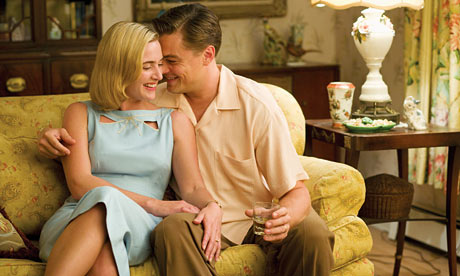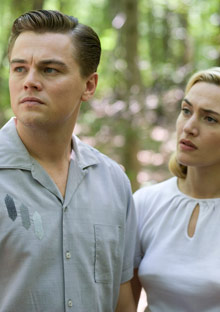
I remember first seeing Sam Mendes interpretation of ‘Revolutionary Road’ in the cinema with a friend. My relationship at the time was going through a ‘bleak’ patch and the film really struck a chord with me. What I witnessed was the disintegration of a once passionate and dynamic relationship; one that was transforming from desirous potential and intensity and festering into something hollow, stark and numbing. I have a slight obsession with the psychology of love and relationships, the climactic heady rise of the first few encounters and the steady plateauing that if not maintained leads to speedy disintegration. Because my views of relationships are less ‘Disney Princess rosy’ (I think monogamy and marriage are constructs and we are in fact designed to be with many partners, weathering the starts and ends of each experience), I am really drawn to films like this, which balance the early potential of new relationships, the abundance and fruitfulness of their fulfilment and the steady combustion as the passion wanes.

Frank and April Wheeler were once madly in love. They had expectations, dreams and desires for their future together. April wanted to be an actress, but that aspiration never really materialised in her life. Frank too had his own ambitions, and though he values the stability, consistency and prestige of his work, he despises the commute and tedium of his working life. April slowly becomes obsessed with the idea of relocating to Paris and of injecting into Frank a new dream or purpose. Having never achieved her ambition of being an actress, April seems to think the next best thing is helping Frank locate, define and achieve his own. The drudgery and disappointment of Suburban life only encourages the incorrigible April further. For her, the only solution is to relocate to Paris. In the suburbs, she is suffocating, drowning, flailing miserably in a sea of identical houses and white picket fences. Paris represents freedom, adventure, romance and spontaneity.

Frank coins the phrase ‘hopeless emptiness’ which is really quite a way to sum up the way that millions of people live their lives. The couple fire fight the maddening inertia of these two emotions, but all is not well in paradise. Frank embarks on an affair with a pretty work colleague and April sleeps with Shep, her neighbour’s husband, who has always secretly been in love with her. To complicate their plans, Frank receives a promotion at work which prompts him to rethink their choice to relocate and only intensifies Frank’s deeply engrained roots in the working world. April becomes pregnant and as such is literally shackled once again to the selfless role of motherhood, a role that she can no longer face with her keen awareness of a world beyond that promises freedom and relief from the narrow confines of her existence.
April quickly becomes unstable, disappointed and horrified at Frank’s desire to remain in the Suburbs and at her own bodies betrayal in becoming pregnant. Hysterical, unresponsive and temporarily insane, April sinks beneath the crushing weight of her evaded dream. Eventually, she decides that the only solution to her predicament is to abort her unborn child – the shackle, the weight, the prison that is preventing her from escaping Revolutionary Road, but the consequences of this act will finally shatter Frank and April’s paired unit, as escape she does, but not in the way she intended.

Shep and Milly Campbell, the neighbours, are the foils of Frank and April. They too are a young, idealistic couple, with tensions and half truths simmering beneath the surface. Their true desires, wants and dreams are left repressed and uncommunicated for fear of disrupting their artificially rich life – the veneer of Suburban safety and success – the pinnacle, the summit of 1940’s middle class experience. Who should admit to being unfulfilled, discontent, bored by the cushy lifestyle many aspire to and envy? The house, the husband, the children? The only character to understand April in particular is John, who is perceived by all other characters as deeply insane. Whether he actually is, or whether he was simply labelled as such at the time by society, John understands the hopelessness and emptiness the Wheelers are struggling against. He too is bored silly with life, and is locked away for it. John admires the Wheelers for planning their escape, but when their plans fall through, he becomes filled with venomous hostility and disillusionment, accusing them of cowardice and of facilitating their own downfall through the conceiving of their child.
There are many films made about the crushing discontent to be located in Suburbia (Little Children, American Beauty, Fight Club, The Matrix, We Need to Talk About Kevin, Lolita, The Virgin Suicides). It’s a popular subject. The home, the heart of society, has come under constant attack for not being exciting or spontaneous enough, yet for many, it is still the dream – it is still the place to reach, the cherry on the cake, the sign of making it.
I can’t shake a stick at Suburban life. I was raised alongside my brother by loving parents in a beautiful home. We had regular holidays, went to school, had anything our little hearts desired and were raised well and raised happy. I made it to adulthood with few scrapes, bumps and misdemeanours. I wouldn’t be the person I am today without that safe and secure upbringing that my parents sacrified to provide. For a child, this foundation is bliss.
But looking with adult eyes, and perhaps its youth speaking, I can’t think of anything worse. I want a life of adventure, change, journeys, excitement, an element of unpredictability and danger. As such, watching Revolutionary Road terrified me. What if cohabiting, marriage and family is really like that? Silent, deadly, withheld hatred, resentment and disgust? Having spoken to many married people in my life, naturally the subject comes up and I'm always surprised and a little scared by the wistful longing and niggling regret that permeates a lot of these conversations. Regular warnings heed: "Live your life first", "don't settle too young", "I wish I had done x, y, z first", "my partner doesn't want me to be x, y, z", "I don't think my partner was the one" and "no one tells you how hard marriage is. That's one thing most people don't want to talk about".

What’s good about films like this as that they help viewers fall into one of two camps; those that will vigorously defend the importance of the family and the home and those that will desperately want to escape it, and that’s one of the interesting cornerstones of experiences that make humans so different and so fascinating.
I’ve never really wanted marriage, nor children, nor really a long lasting and forever relationship in the typical sense, but as I say, I’m young, and I have a lifetime to change my mind. For me, April’s life would be hell, simply because there’s so much I want to do from an independent standpoint and also because the losing of ‘love’ in its early, delightful stages saddens and bothers me. I’m terrified of the settling, of the slow dissipation of the maddening, Romeo and Juliet passion of the early days. Contrasting Frank and April’s early fight for freedom and castles in the sky thinking with their boring, ‘just like everybody else’ marriage made me sad and made me wonder, ‘is any love unusual, special or unique enough to survive this premeditated pattern?’.

This was a film about husbands and wives, two separate entities meshed as one, sacrificing dreams, wishes and expectations for a semblance of togetherness, and hating one another for it. April hated Frank for his cowardice, Frank hated April for her wanderlust and as Howard Givings turns down his hearing aid as he listens to his wife ramble at the end, we are left to bask in boredom, in the falling out of love, to wander in the husks that are left there, because the ruins were once a great civilisation.
Well worth a watch, but maybe not if you are dissatisfied with your lot in life at the moment. Today we have choices and that might be confusing and complicated, but thank god we have them. Today, if you don’t want to be a Frank or April, you don’t have to be.
The film also leaves you thinking that it’s not ‘settling’ that’s the problem. The problem is a culmination of factors ranging from differing expectations, lack of communication, deep rooted discontentment and even potentially mental illness? Is April a free spirit in a neatly stacked world, or is she depressive, anxious, permanently and pathological unhappy, and if so, what is the root of this? Is the issue the fact that new families are locked away in pretty secular isolated houses with no real sense of community or culture on which to depend? Would the Wheelers be any happier in Paris, city of history, love and culture? Or would their problems and maladies follow them? Are all women cut out to be mothers and wives, or are some women’s spirits simply crushed by taking on a role that ‘naturally’ fits them yes, but doesn’t suit them quite so realistically in day to day life? April wants to be special and she believes she is destined for something great. Is this the great, unshakable truth she’s forsakes, or is this the lie? Are any of us really special? Do any of us really deserve anything ‘different?’ April damns and reduces Frank in one quip that really caught my attention: ‘you’re just some boy that made me laugh at a party once’. Is this what we built our lives and futures around? The unreliability and inconsistency of fleeting romantic love?
Some have claimed that this film is what Jack and Rose’s relationship would have been like had they survived the Titanic together, but it is wonderful to see the beautiful Kate Winslet and the striking Leonardo DiCaprio together again.
No comments:
Post a Comment